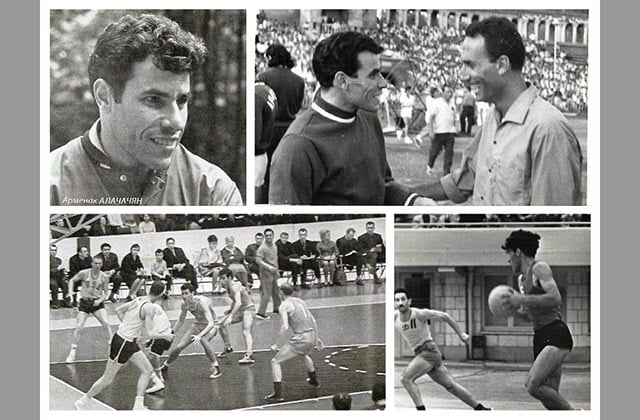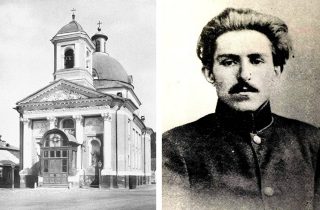Remembering Armenak Alajajian – Armenia’s Basketball Legend

Famous Armenian basketball player Armenak Alajajian (Armenak Alachachan) passed away at the age of 87 in Toronto, Canada, on December 4th, 2017.
Armenak Alajajian’s achievements and support to the Armenian world are countless – starting from his achievements as one of the most famous Soviet athletes in the 1960s and ending up with his continued support to the Armenian community of Canada as AGBU’s basketball team player and coach. Armenak’s life was not an easy one. His life went through struggles, but he always did his best to go the extra mile to perfection and didn’t forget to give back to his community.
Early Life and Repatriation to Armenia
Armenak Alajajian was born in Alexandria, Egypt on December 25, 1930 and was part of the Armenian Diaspora caused by the 1915 Genocide. His mother had been an orphan who had barely escaped the Ottoman Empire’s deportations and mass killings of Armenians. Young Armenak attended Poghosian High School in Egypt and graduated in 1947. In 1948, there was a patriotic wave of Diaspora Armenians going to repopulate Soviet Armenia, which was part of the USSR at the time. After his move to Armenia in 1948, Armenak was accepted into the Yerevan Institute of Physical Education.
Despite being short by basketball standards, Alajajian began to excel in the sport. He first played with Yerevan SKIF, then the Armenian republic team and later with Alma-Ata Burevestnik in the soviet republic of Kazakhstan. He would become a basketball star not by natural size and talent, but made himself one by hard work and careful analytic study of the game. He was loved by his fans and coaches alike.
The Basketball Legend
Following success in Kazakhstan, Alajajian was invited in 1959 to CSKA-Central Sport Club of the Soviet Army in Moscow. From that time on, Armenak was no longer considered an above average basketball player, but an accomplished professional. He was one of the best shooters in Soviet basketball. In 1960, shortly after he joined the CSKA Central Sport Club, his team set a record which was unmatched at the time: 11 games – 11 victories!
It is worth mentioning that from 1953 to 1960, the Red Army team had never been champions of the Soviet Union. There were other strong teams, such as the ones from the then soviet republics of Latvia, Estonia and Georgia, and thus, it was very hard to achieve first place. Starting from the very first year that Armenak joined the team and during the subsequent eight years, his teams were repeatedly champions of the Soviet Union.
Alajajian’s fans loved his style, particularly the tricks he performed. These made him stand out as an exceptionally exciting player on the court. One remarkable story was his play against the American team, as told in Anatoly Pinchuk’s book “I Shall Limit Myself with Basketball” (Moscow, 1991). It cites excerpts from Armenak Alajajian’s book “Not Only About Basketball.” In 1964, during a game against the American basketball team playing in Moscow, he did one of his tricks for which he was famous. As he was moving forward, he finished dribbling, and he had to choose either to pass or dash to the basket.
Instead, Alajajian firmly shot the ball off the backboard in such a way that the basketball immediately rebounded to him. He thereupon immediately passed the ball to a team member who had been deliberately stationed close to the basket – swish, two-points! As a professional who had mastered the extraordinary trick, Armenak had calculated that all five American opponents would instinctively look at the ball and backboard. In that brief instant, they would lose sight of his whereabouts. But both Armenak and his teammate knew the value of a fraction of a second in such a setting and the manoeuvre worked.
Upon seeing the unorthodox and innovative play, the USA national team coach John McLendon jumped up from his bench and gave Alajajian a long, standing applause. Armenak had earned his distinguished opponents’ respect. As each of the American players were substituted onto the court, Alajajian was the first and foremost player from the Soviet team that they would approach and generously acknowledge. Armenak Alajajian played wearing sweater number six on both the CSKA and USSR national team. The ovations that number six received had no equal at the time.
All this success did not come by itself. It was a result of long, hard work and much perseverance. His coaches greatly admired him. During his long career, none of his coaches would ask him to do more than he was already doing. The reason for that was the simple fact that there was no need to tell him that “he had to work more and to try harder”, because he was already doing more and more. Every time he could, he sought to do more in a long series of steps towards perfection. During his entire life in a country where men smoking was the norm, Armenak did not try one single cigarette, even for curiosity. In a country where heavy drinking was too common, he didn’t consume any alcohol either. Only once did he try a few sips of cognac at a celebration party. As he took several sips from the shot glass, he called out with laughter: “I am drunk, I am drunk!” The next morning, he approached his friends with genuine surprise and posed the serious question: “How can you even drink this by the bottle?”
As he continued his career with the Soviet national team, he set new records with his teammates. Most notable, as the pivotal point guard, he led the team to the Olympic Silver medal in Tokyo in 1964 with an 8-1 record, coming second only to the American team.
Immigration and Life in Canada
While Armenak was breaking new records in his basketball career, grave problems began to emerge and create significant obstacles in his life. At that time, the KGB secret police monitored and controlled much of Soviet society. Even famous people fell under its powerful influence. Suddenly, Armenak was not allowed to play as much; he was not even allowed to travel to play in Europe. The pretext offered was that he had an older sister living in Canada and that he might defect. In one later interview, Armenak recalled that the KGB had attempted to recruit him, but he bravely and firmly refused. He was not interested in power politics or international intrigue. His passion was sports. He observed: “Finally, in 1963 I was able to go to Madrid for the European Cup games – Marshall Grechko personally vouched for me, so I would be allowed to go. In 1968, I became the head coach of the Red Army team. In that season, we won the European Cup from the “Real Madrid” team in Barcelona. It was a difficult game, with overtime.
Until then the Spanish team was always proud that they never lost on their home base… but we made them loose”. Continuing he added: “When we returned to Moscow, they started searching – apparently someone told the Ministry of Defense that every player of the (Red Army) team had received $6,000 cash, which was an absolutely false allegation, and that I had something to do with it. They even complained that the team members were not participating in the work of the Komsomol [Youth Branch of the Soviet Communist party]. This made me understand that they were not going to let me work, and I applied to leave for Canada to join my [extended] family.”
Repeated threats and intimidation by the KGB brought Armenak – Soviet Armenia’s basketball legend with 17 gold medals and a Silver Olympic Medal from Tokyo (1964) – to realize that he was no longer safe remaining in the Soviet Union. Accordingly, he and his family decided to immigrate to Canada, where his mother and both sisters lived. Arriving in Canada in 1974, life turned out to be initially quite difficult for the older immigrant in his mid-forties. At the time, the most popular game in Canada was hockey, with very little attention paid to basketball. Armenak had professional friends in the United States, one of them was Larry Brown, who had played for the United States against the Soviet team in the 1964 Tokyo Olympic Games. Brown was now a coach in the NBA.
He offered Armenak a job in basketball, but Armenak’s mother was anxious about the prospect of her son leaving for the USA and breaking up the recently reunited extended family. Armenak decided to stay in Canada. His immigrant work challenges started with long hours in a manual labour job moving cars around in a downtown parking lot. Being used to struggle and hard work all his life, Armenak worked swiftly and for long hours, even in innovative and unorthodox ways.
One day, unexpectedly two former fans from the Soviet Union, who were now businessmen, recognized him and offered to tutor him in the gold business in Toronto. After a number of months of apprenticeship learning the gold and jewelry business and with a modest family loan, he opened up “AAA Diamonds LTD”. It proved to be a highly successful manufacturing and retail venture in downtown Toronto that operated from then until now.
Armenak continued his basketball wherever he could. In 1974-1975, he was the coach of Humber College basketball team in Toronto. From 1974 to 1990, Alajajian coached the Armenian General Benevolent Union basketball team in Toronto. He was also a philanthropist to the city’s Armenian Holy Trinity Church, the Armenian General Benevolent Union and numerous other Armenian causes.
Armenak Alajajian’s books, brochures, essays and notes were published in hundreds of thousands copies in the Soviet Union. His words appeared in Russian and Armenian newspapers and on TV and radio programs. Most notable were his two published books in Russian: “Notes of a Basketball Player” (Moscow, Publishing House of Physical Culture and Sport, 125 pages); and “Not Only About Basketball” (Moscow, Molodaia Gvardia, 319 pages; translated into Estonian as well).
Starting in the late 1990s, there were unsuccessful efforts to have him inducted into the Basketball Hall of Fame in Massachusetts, United States. At that time, there was less interest in international basketball stars, let alone from the former Soviet Union. However, in recent years, there has been a renewed recognition of Armenak Alajajian’s pioneering role. The winner’s trophy at a recent pan-Armenian basketball tournament in Yerevan is named after him. Certainly, many local Toronto Armenian basketball players continue to be inspired by his legacy.
Friends and Relatives about Armenak Alajajian
Distinguished writer and genocide scholar Alan Whitehorn remembers his uncle with pride and recalls hearing exciting comments from his high school football coach Rolly Goldring, who was also a member of the Canadian Olympic basketball team. Whitehorn adds “Among my special memories was speaking with Rolly Goldring in 1964 as he prepared for Canada’s Olympic basketball team. The first game Canada played in Tokyo was against the Soviet team, which included my uncle. Defying the Cold War barriers, these two Olympians exchanged personal and private best wishes. Upon Rolly’s return to Canada, I was grateful for his kind comments and insights. Sadly, they both died in Toronto within weeks of each other.”
Levon Yazejian, a dear family friend and former treasurer of the Toronto AGBU, who spoke at the church funeral service, observed that Armenak brought energy and brilliant strategy to the game. Quoting the player himself: “In basketball the game changes constantly: one moment it is defense, the next is attack! I like the control in directing the game”. Levon also added that “it is not surprising that Yuri Gagarin, the first man in space, commented that ‘Armenak blasts like a rocket.’ In an overview of Armenak’s career, Levon Yazejian pointed out that “Armenak, during his Soviet national basketball team years, won 17 gold medals, a silver medal in 1964 at the Tokyo Summer Olympics. …Accordingly, it is not surprising that on January 17th, 2000, the Russian Basketball Federation recognized Armenak Alajajian as one of the top five players of the century. Moreover, in that same year, the Armenian government issued a commemorative stamp honouring Armenak Alajajian as a champion of many basketball games in the former Soviet Union and Europe.”
Levon Yazejian noted that in later years in Canada “Armenak invariably attended and coached every game tournament that the AGBU held all over the world – Canada, North and South America and Europe. Not only did he attend and coach the young athletes, he generously supported financially towards their trips overseas. His generosity had no bounds. At the AGBU Centre, he had the basketball arena floor refurbished and supported many events at the Centre by donating jewelry items for lottery prizes.”
Salpi Der-Ghazarian, Executive Director of the Armenian General Benevolent Union of Toronto, says Armenak Alajajian had a key role in the formation and development of the AGBU in Toronto’s Armenian community. “He was the AGBU’s basketball team coach, and played a vital role in Toronto’s AGBU Alex Manoogian Cultural Centre since its opening in 1981. He was a great mentor to the youth and a vigorous supporter of the AGBU sports program, especially basketball. Other than basketball, Armenak had another passion: Armenia and Armenian culture. Whenever we invited young artists from Armenia, children artists, Armenak was there with his big heart and generosity. He was the Santa that put a huge smile on their faces, and that made him very happy,” said Salpi Der-Ghazarian.
He was a remarkable man who grew up in a difficult world. He defied the odds, as both a basketball player and Diaspora son of a genocide survivor.
Awards in Basketball
1953, 1961, 1963, 1965: Gold Medal for playing on the winning team at the European Championship for the years listed.
1959-1966: Winner of the USSR Championships
1960, 1961: European Cup Basketball Winner
1961: Master of Sport (International Category)
1960-1965: Most Valuable Basketball Playmaker award, USSR
1963: Medal for Distinguished Sports Achievement
1964: Silver Medal in Basketball at Tokyo Olympics
1964: Order of recognition of USSR (“Znak Pocheta”) for winning silver medal at Tokyo Olympic Games.
Prepared by Kamo Mailyan
Toronto-Yerevan
























